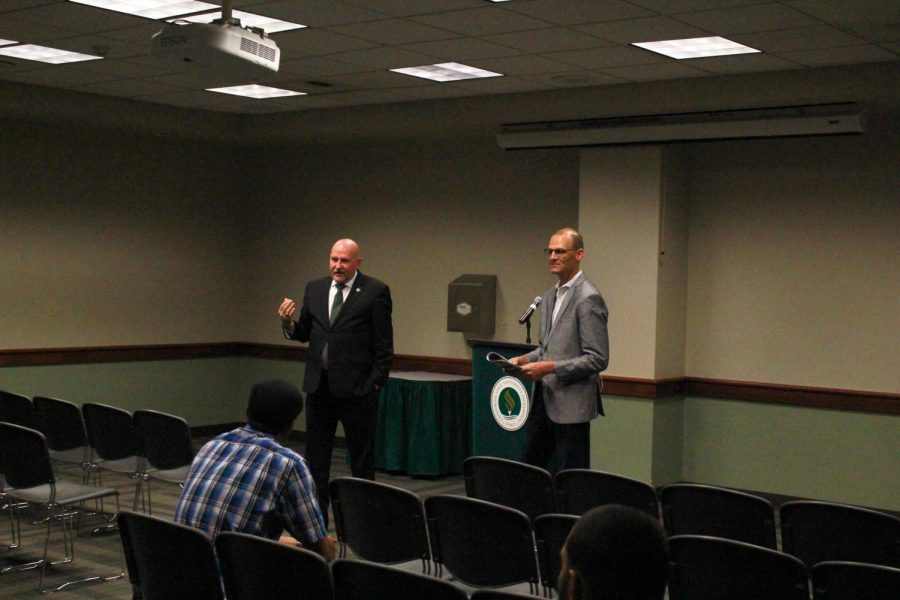Kevin McCarty holds Q&A session at Sac State
Will Coburn – The State Hornet
From left, Sacramento State President Robert Nelsen and California Assemblyman Kevin McCarty at McCarty’s question and answer session at Sac State on Friday.
Assemblyman Kevin McCarty, D-Sacramento, answered questions about funding the California State University system and two of his criminal justice reforms at Sacramento State Friday.
McCarty started off with topics of funding higher education and preventing tuition increases.
RELATED: CSU will not raise tuition for 2018-2019 school year
“I’m optimistic that we’ll be able to adequately fund higher education in California, especially the CSU system,” McCarty said. “Sometimes it’s better to be lucky than good, and the economy is booming. We have $10 billion in revenue over last year’s budget to take a look at this year, and to take the opportunity to invest in an important area like CSU.”
Both McCarty and Sacramento State President Robert Nelsen said that even if funding is secured for this year, there’s a longer struggle ahead to secure long term funding for higher education.
They said that by needing to negotiate for adequate funding each year, that is would mean a higher risk of a tuition increase in the future.
The lack of long term funding led to what Nelson called, “a very large deferred maintenance problem.”
RELATED: Audit of CSU finds health and safety oversight inadequate
“There’s no other way to put it,” Nelsen said. “We need to fix a variety of things, we’re doing it, but we need to continue improving safety on campus.”
At a Q&A at @sacstate @KevinMcCartyCA recounts his winding route through CA’s education system @TheStateHornet pic.twitter.com/3T9FUoGMEH
— William Coburn (@WillHearYou) April 27, 2018
Criminal justice reform was also a major topic of discussion. McCarty has authored AB 1940, a bill to help less the restrictions from and possibly end parole sooner for former inmates that are going to school, working, or part of community programs.
McCarty also co-authored AB 931 which would increase the standards that police are required to follow for using death force from “when reasonable” to “when necessary.”
“What we’re proposing I don’t think is that far fetched,” McCarty said. “The idea that we’re looking at is that officers to only use deadly force when necessary, most people would say, ‘hey, that makes sense to me.’ ”
There’s been some debate, according to McCarty, on how much impact the changing of the standards will actually have, however he said he’s optimistic that this will be the first step in a series of legislation that will help train officers to not use lethal force.
“There’s a lot of ways officers can do it, and do do it on a daily basis,” McCarty said. “After we further engrain that in our practices we do that, we address issues with implicit bias.”
Associated Students, Inc. president Mia Kagianas was in attendance and said she appreciated the chance to talk closely with the assemblyman not just as a constituent but because it was educational experience.
“He’s always very well thought out,” Kagianas said. “And he’s a very good critical thinker. When he answers questions I pay attention to how he answers them, what he’s thinking when he answers them, he’s a really thoughtful and empathetic speaker, and he’s got a lot of knowledge in a lot of areas.”
Your donation will support the student journalists of Sacramento State University. Your contribution will allow us to purchase equipment and cover our annual website hosting costs.


























































































































